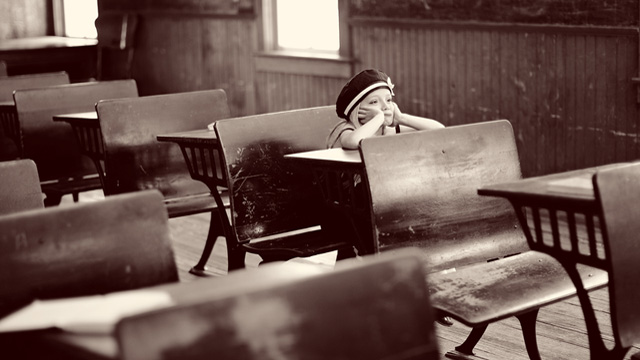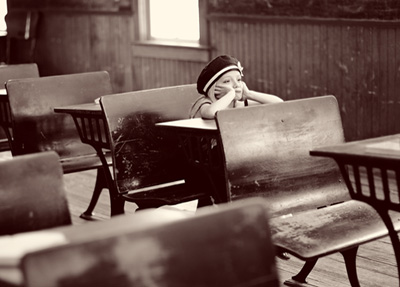How not to choose a good school
It can change your child's life, so what should you look out for when it comes to choosing their seat of learning, asks The Good Schools Guide's Janette Wallis


This article first appeared in Country Life's Spring Schools Supplement 2014
The Independent Schools Association has provided some good advice on choosing schools and we won't quibble with a word. In fact, there's a lot of good advice around on the subject-we dispense some of it ourselves.
But, with all this great advice swirling around, how is that some parents still make a hash of it? Why do so many families lack confidence when choosing an independent school? Here's our advice on avoiding the most obvious pitfalls.

Don't choose a school by looking at its youngest age groups
We all tend to do it-peer in at all those cute children working purposefully in the reception class, the lined-up wellies, the brightly painted classrooms-and weight our judgements towards the end of the school that's closest to our own child's age. Resist! Take a cool, hard look at the scary top of the school instead. What are the older children like?
What's happening in their classrooms-are children still engaged once they hit puberty or are they slumped and dozing? What subjects are offered and do the extracurricular activities dry up or flourish in these older age groups? Make sure to ask any school you're seriously considering for its lists of leavers' destinations covering the past three years so you can see where pupils have gone next.
Don't follow the pack
Exquisite houses, the beauty of Nature, and how to get the most from your life, straight to your inbox.
It's hard to hear a neighbour, friend or relative wax lyrical about their child's school and not be tempted to sign up there and then. But remember that most parents tend to speak well of the school their own child attends. Don't rely on them. Don't rely on school websites. Don't rely on Mumsnet. Don't even rely on The Good Schools Guide (although it's a good place to start).
You're looking for a school that's best for your child, not someone else's. I once signed my daughter up for a nursery, sight unseen, because my favourite neighbour had researched our local options and pronounced this one best. It wasn't and I had some fast talking to do so that I could move my daughter elsewhere. Do, of course, grill your contacts, especially to find out about specifics (what are the music teachers like? do you have to pay extra if your child needs extra help?). But there's no substitute for visiting a school and getting your own feel for it.
Don't tangle with geography
The world is not your oyster. The worst thing people can do when school hunting is to start with too broad a canvas. ‘We're looking for the best school in England,' parents will frequently announce to our Advice Service. ‘I'm more than happy to drive for up to 90 minutes each way,' one mother told me cheerfully. That changed the first time her son left his pencil case at home and phoned her begging her to bring it in, mid-morning, seconds after her slog home from the morning drop. Frankly, things have to be really quite bad at your closest schools before you should consider looking further afield. Give yourself a gold star if both (or all) of your children can attend the same school.
Don't assume all schools charge similar fees
Independent schools got rapped on the knuckles for price-fixing eight years ago and, since then, the spread of fees has widened. Look closely at what's included (lunches? textbooks?) as ‘extras' can mount up alarmingly. Some schools whack on a baffling ‘entrance fee' or ‘capital levy'. Will fees be higher in the upper echelons of the school?
What bursaries and scholarships are on offer? More than a quarter of children at independent schools now receive some level of fee assistance. Keep in mind that you may have a better chance of getting help if you look for schools that emphasise the skills at which your child excels. But beware of the increasing number of ‘phantom scholarships' being offered, which provide plenty of prestige, but little-or even nothing-off the fees.
Don't get hung up on details
Or at least try not to. You're unlikely ever to find a school that educates your child exactly as you would if you ran one out of your front room. Don't choose a school on the basis of whiteboards, tablets, the uniform, the head having attended the same school as you, the existence, or not, of Saturday school (you'll get used to either) or league-table position alone. Above all, don't lose sight of your own child in the hunt for the perfect school.
EXPERT ADVICE
Neil Roskilly, chief executive officer of the Independent Schools Association, recommends actions parents should take:
* Visit a good range of open days, but always follow up with a private visit
* Check out the school's most recent inspection report
* If your child is gifted or particularly talented in one or more curriculum area, or if they have a recognised special educational need or disability, make sure that the school has expertise in this area
* Speak to other parents, ideally in a social setting rather than through an advocacy programme arranged by the school
* Subscribe to Country Life and save
* Follow Country Life magazine on Twitter
Country Life is unlike any other magazine: the only glossy weekly on the newsstand and the only magazine that has been guest-edited by His Majesty The King not once, but twice. It is a celebration of modern rural life and all its diverse joys and pleasures — that was first published in Queen Victoria's Diamond Jubilee year. Our eclectic mixture of witty and informative content — from the most up-to-date property news and commentary and a coveted glimpse inside some of the UK's best houses and gardens, to gardening, the arts and interior design, written by experts in their field — still cannot be found in print or online, anywhere else.
